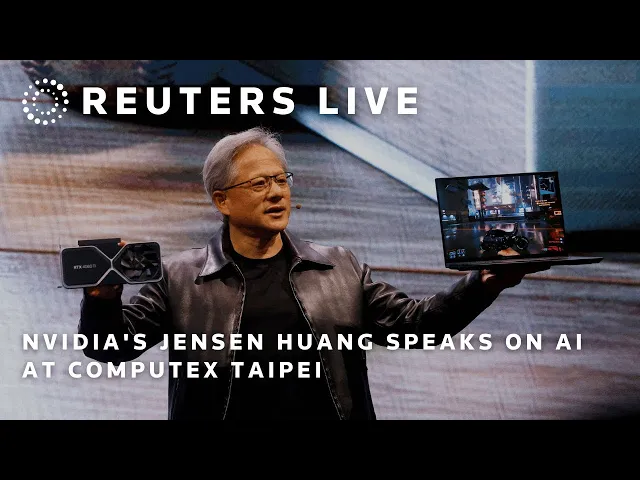LIVE: Nvidia’s Jensen Huang gives speech on AI

Nvidia's Huang envisions AI's transformative future
In a recent address captured by Reuters, Nvidia CEO Jensen Huang painted a compelling vision of artificial intelligence's trajectory and its profound implications for society and business. Speaking with characteristic enthusiasm and technical depth, Huang articulated how AI represents not merely an evolution in computing but a fundamental transformation that will reshape industries and human potential. The speech offers a privileged glimpse into how one of tech's most influential leaders conceptualizes our AI-driven future.
Key insights from Huang's address:
-
AI is transitioning from specialized tool to universal computing paradigm, with Huang describing a future where AI becomes a fundamental part of all computing infrastructure rather than remaining a separate technology category.
-
The convergence of software, hardware, and data center architecture is creating unprecedented computational capacity, enabling AI systems that were unimaginable just a few years ago.
-
Democratization of AI capabilities remains a central focus, with Huang emphasizing how technologies previously accessible only to tech giants are increasingly available to organizations of all sizes.
Perhaps the most compelling perspective Huang offered was his framing of AI as a "new type of computer that writes its own software." This conceptual shift fundamentally changes how we should think about computing's future. Rather than viewing AI as simply another tool in the developer's toolkit, Huang positions it as a paradigm shift comparable to the internet's emergence—a technology that doesn't just improve existing systems but creates entirely new possibilities for human creativity and problem-solving.
This matters tremendously in today's business context. Companies that continue treating AI as merely an enhancement to existing workflows risk missing the transformative potential Huang describes. The true value proposition isn't faster data processing or automation of existing tasks—it's the creation of entirely new capabilities and business models. Organizations that grasp this distinction will likely outpace competitors who view AI through the lens of incremental improvement rather than fundamental transformation.
What Huang didn't fully address, however, was the significant organizational challenges this transformation presents. The adoption of AI as a foundational computing paradigm requires more than technological investment—it demands profound changes in organizational structure, talent strategies, and decision-making processes. Companies like Airbnb and Spotify offer instructive examples here. Both have restructured their engineering organizations specifically to integrate AI capabilities throughout their products, rather than maintaining
Recent Videos
How To Earn MONEY With Images (No Bullsh*t)
Smart earnings from your image collection In today's digital economy, passive income streams have become increasingly accessible to creators with various skill sets. A recent YouTube video cuts through the hype to explore legitimate ways photographers, designers, and even casual smartphone users can monetize their image collections. The strategies outlined don't rely on unrealistic promises or complicated schemes—instead, they focus on established marketplaces with proven revenue potential for image creators. Key Points Stock photography platforms like Shutterstock, Adobe Stock, and Getty Images remain viable income sources when you understand their specific requirements and optimize your submissions accordingly. Specialized marketplaces focusing...
Oct 3, 2025New SHAPE SHIFTING AI Robot Is Freaking People Out
Liquid robots will change everything In the quiet labs of Carnegie Mellon University, scientists have created something that feels plucked from science fiction—a magnetic slime robot that can transform between liquid and solid states, slipping through tight spaces before reassembling on the other side. This technology, showcased in a recent YouTube video, represents a significant leap beyond traditional robotics into a realm where machines mimic not just animal movements, but their fundamental physical properties. While the internet might be buzzing with dystopian concerns about "shape-shifting terminators," the reality offers far more promising applications that could revolutionize medicine, rescue operations, and...
Oct 3, 2025How To Do Homeless AI Tiktok Trend (Tiktok Homeless AI Tutorial)
AI homeless trend raises ethical concerns In an era where social media trends evolve faster than we can comprehend them, TikTok's "homeless AI" trend has sparked both creative engagement and serious ethical questions. The trend, which involves using AI to transform ordinary photos into images depicting homelessness, has rapidly gained traction across the platform, with creators eagerly jumping on board to showcase their digital transformations. While the technical process is relatively straightforward, the implications of digitally "becoming homeless" for entertainment deserve careful consideration. The video tutorial provides a step-by-step guide on creating these AI-generated images, explaining how users can transform...
